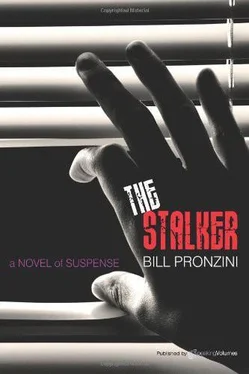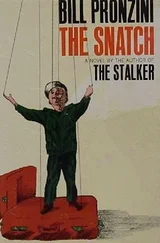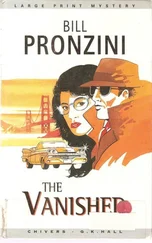Bill Pronzini - The Stalker
Здесь есть возможность читать онлайн «Bill Pronzini - The Stalker» весь текст электронной книги совершенно бесплатно (целиком полную версию без сокращений). В некоторых случаях можно слушать аудио, скачать через торрент в формате fb2 и присутствует краткое содержание. Жанр: Старинная литература, на английском языке. Описание произведения, (предисловие) а так же отзывы посетителей доступны на портале библиотеки ЛибКат.
- Название:The Stalker
- Автор:
- Жанр:
- Год:неизвестен
- ISBN:нет данных
- Рейтинг книги:4 / 5. Голосов: 1
-
Избранное:Добавить в избранное
- Отзывы:
-
Ваша оценка:
- 80
- 1
- 2
- 3
- 4
- 5
The Stalker: краткое содержание, описание и аннотация
Предлагаем к чтению аннотацию, описание, краткое содержание или предисловие (зависит от того, что написал сам автор книги «The Stalker»). Если вы не нашли необходимую информацию о книге — напишите в комментариях, мы постараемся отыскать её.
The Stalker — читать онлайн бесплатно полную книгу (весь текст) целиком
Ниже представлен текст книги, разбитый по страницам. Система сохранения места последней прочитанной страницы, позволяет с удобством читать онлайн бесплатно книгу «The Stalker», без необходимости каждый раз заново искать на чём Вы остановились. Поставьте закладку, и сможете в любой момент перейти на страницу, на которой закончили чтение.
Интервал:
Закладка:
Drexel relaxed. Damn, but he was edgy. He was beginning to jump at shadows again, the way he had done those three years in Illinois, waiting. Ease down, he told himself, cool now. Then he stood and went over and unlocked the door.
Fran Varner came in past him, wearing her hostess outfit—a short, flaming scarlet enredo and a sleeveless, low-cut, very tight white blouse. Her smile was hesitant, like the knock had been. She said, “Hi,” turning to face him.
“Hi, kid,” Drexel said.
“I was wondering if . . . you were going to take me home.”
“Didn’t you bring your car?”
“Well, yes, but—”
Drexel grinned. Yeah, he had to ease down all right, and there was one sure way of doing that. He let his eyes walk appreciatively along her smooth, tawny legs and upward across her flat stomach to the swell of her breasts. “Sure,” he said. “I know.”
She lowered her eyes. “You’re not still mad at me, are you?”
“Mad at you?”
“You hardly said two words to me today, and after yesterday . . . well, I thought—”
Drexel put his hands on her shoulders. “Don’t be silly, kid,” he said softly. “I’ve had some things on my mind, that’s all.”
“It wasn’t me?”
“No, it wasn’t you.”
“Larry ...”
He brought her up close against him, kissing her, letting his tongue flick over her lips. Her arms went around his neck as she returned his kiss passionately, tongue meeting his, her body fitting to his. He took his left hand from her shoulder and let it slide down to cup one of her breasts, kneading gently; breath came in sharp, staccato explosions from her nostrils. But when his hand left her breast and moved down to her thigh, coming up under the wrap-around skirt, she broke the kiss and stepped back, face flushed, chest lifting and falling rapidly. She said in a whisper, “I’ll make supper for you tonight, if you want.”
“Sure,” he said.
“Fried chicken and cole slaw and apple turnovers.”
“That’s the ticket.”
“I love you, Larry.”
“Sure, baby,” he said. “Listen, you go down to the lounge and wait for me. I’ll be along in a couple of minutes.”
“All right,” Fran said. “Don’t be long.”
“A couple of minutes.”
He watched the movement of her hips under the skirt as she left the office, thinking: Some sweet piece of ass, all right, he would be calm as a baby after a session in the sack with her. When the door had closed behind her, he returned to his desk and slid the center drawer open. He lifted out the .38-caliber Smith and Wesson revolver that he had bought and registered and received a permit for just after opening El Peyote. He put the gun in his left-hand jacket pocket and took his overcoat from the rack near the door; the weight of the revolver, which pulled down the left side of the suit jacket, was not noticeable when he had the overcoat buttoned.
He wasn’t going unprepared, that was for sure. Helgerman would find one hell of a hot reception waiting for him if he came after Larry Drexel before Drexel had the chance to look him up . . .
7
When Jim Conradin had been a senior in high school, he had read as part of an advanced English Literature course Joseph Conrad’s The Heart of Darkness . Toward the end of that richly symbolic novella, a German exploiter named Kurtz lies dying in the pilot room of a steamer in the atavistic jungles of the Congo. Maddened, but still capable of moments of rational lucidity, Kurtz cries out to the narrator of the story, Marlow, with perhaps his final breath: “The horror! The horror!”
Which meant what? Conradin’s instructor had asked in an essay assignment. The horror of death? Of the primordial wilderness and what it can do to a man? Or of something else, as suggested by the events of the story? Conradin had written that “the horror,” Kurtz’s and every man’s, was the sight of his own soul, stripped bare before his eyes to reveal it for what it could and had become. The “heart of darkness,” then, he had said, was not the Congo of the late eighteen hundreds—but the very essence of man.
As he paced cat-nervous from one room to another in the big white house on the northern flat of Bodega Bay, Conradin was oddly reminded of that story, and of his perception at age eighteen. He took short, quick sips from a tumbler half filled with sour mash bourbon as he paced—sitting room, kitchen, upstairs hall, cellar workshop, bedroom, storage porch—stopping for a moment to stare out at the black wall of fog enshrouding the house, moving once more, thinking: The horror! The horror!
He was in the sitting room again when Trina came in from the hallway, her face mirroring concern, confusion—the same fright which had seized her the day before. She was kneading a floral-bordered dish towel between her hands as if it were biscuit dough. “Supper’s ready, Jim,” she said quietly.
“I’m not hungry, Trin.”
“You haven’t eaten anything all day. It’s after seven.”
“I’m just not hungry.”
She walked up close to him and stood staring into his eyes, trying to read them, and failing. She said, “Jim, what is it? What’s troubling you? What happened last night?”
“Nothing happened last night.”
“Please, dear. You’ve been acting so ... strangely since you came home from San Francisco.”
“I’m all right,” he said. “You go ahead and eat now.”
“Not without you.”
“Do I have to be there for you to eat?”
“No, of course not, but—”
“Well, then?” Conradin finished the dark liquid in the tumbler and moved to the tray of liquor set on an oval table near one wall. He lifted a black-labeled bottle. The bottle, unopened that morning, was now less than a quarter full.
Behind him, Trina said, “I wish you wouldn’t drink any more.”
“Trin, please go eat your supper.” He filled the tumbler, replaced the bottle on the tray, and turned. “Can’t you see I want to be left alone?”
“Yes, I can see that,” she said. “But why ? Why are you shutting me out this way?”
“I’m not shutting your out.”
“Yes you are. You won’t tell me anything about this mysterious San Francisco trip, you won’t talk to me at all. The only things you’ve done today are drink and pace like some caged animal. I’m frightened, Jim. I really am. I’m frightened because I can’t understand what’s happening to you.”
Conradin moistened his lips. “Honey, there’s nothing to understand. Nothing’s happening to me. I’m just feeling out of sorts today, that’s all. You know how I hate the winter.”
“You didn’t used to hate anything.”
“People change,” Conradin said. “People . . . change.”
“Yes, they change. They change and they become strangers. You’re a stranger to me now.”
“Trin . . .”
“I’m your wife,” she said. “Don’t you think I know when something’s wrong? Tell me what it is, Jim. Confide in me—you can do that, can’t you?”
“No. No, I can’t do that.”
“Why can’t you?”
“I just can’t.”
Abruptly, tears began to form in Trina’s eyes. “I . . .” she began, but then the tears came in a rush and she fled the room. Conradin stood there, looking into the hallway after her. He drank the contents of the tumbler in a single convulsive swallow, put the glass down carefully on the eagle’s-claw stand in the hallway, and crossed to the winding staircase which led to the second floor. In his and Trina’s bedroom, he took his sheepskin jacket from the closet and put it on and scraped his car keys off the dresser. He descended the stairs again.
Trina was waiting for him, her eyes tinged in red, but she had dried the tears in the downstairs bathroom and was standing very straight and rigid. She said, “Where are you going, Jim?”
Читать дальшеИнтервал:
Закладка:
Похожие книги на «The Stalker»
Представляем Вашему вниманию похожие книги на «The Stalker» списком для выбора. Мы отобрали схожую по названию и смыслу литературу в надежде предоставить читателям больше вариантов отыскать новые, интересные, ещё непрочитанные произведения.
Обсуждение, отзывы о книге «The Stalker» и просто собственные мнения читателей. Оставьте ваши комментарии, напишите, что Вы думаете о произведении, его смысле или главных героях. Укажите что конкретно понравилось, а что нет, и почему Вы так считаете.












